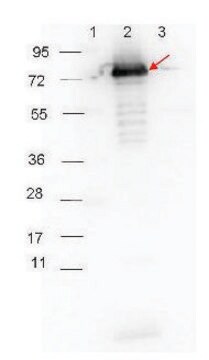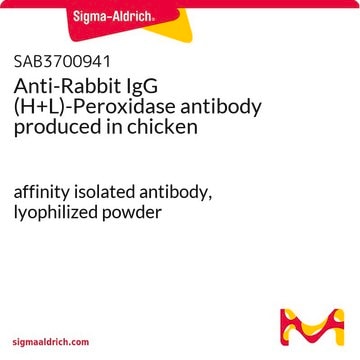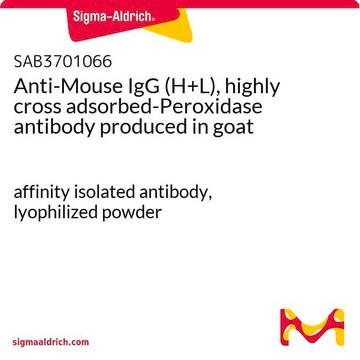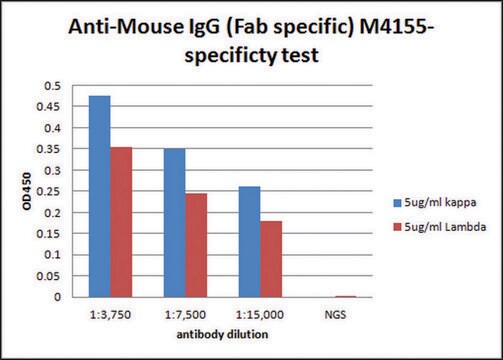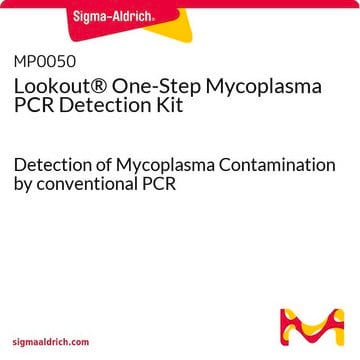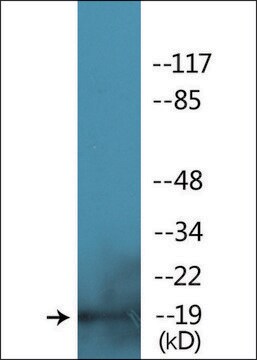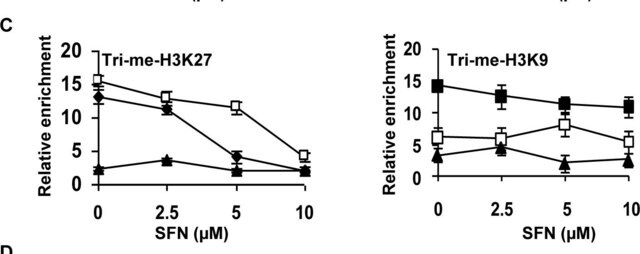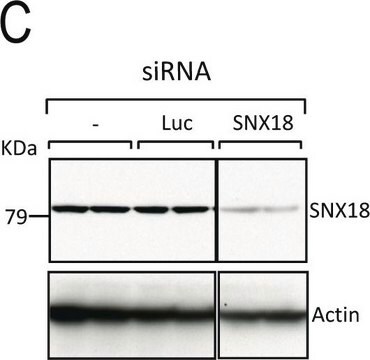SAB3700885
Anti-Rabbit IgG (H+L), highly cross adsorbed-Peroxidase antibody produced in goat
affinity isolated antibody, lyophilized powder
Synonym(s):
HRP, peroxidase
Sign Into View Organizational & Contract Pricing
All Photos(1)
About This Item
UNSPSC Code:
12352203
NACRES:
NA.46
Recommended Products
biological source
goat
Quality Level
conjugate
peroxidase conjugate
antibody form
affinity isolated antibody
antibody product type
secondary antibodies
clone
polyclonal
form
lyophilized powder
species reactivity
rabbit
technique(s)
immunohistochemistry: suitable
indirect ELISA: suitable
western blot: suitable
shipped in
wet ice
storage temp.
2-8°C
target post-translational modification
unmodified
General description
Immunoglobulin G (IgG) belongs to the immunoglobulin family and is a widely expressed serum antibody. It consists of a γ heavy chain in the constant (C) region. The monomeric 150kDa structure of IgG constitutes two identical heavy chains and two identical light chains with molecular weight of 50kDa and 25kDa respectively. The primary structure of this antibody also contains disulfide bonds involved in linking the two heavy chains, linking the heavy and light chains and resides inside the chains. IgG is further subdivided into four classes namely, IgG1, IgG2, IgG3, and IgG4 with different heavy chains, named γ1, γ2, γ3, and γ4, respectively. Limited digestion using papain cleaves the antibody into three fragments, two of which are identical (called Fab fragments) and contain the antigen-binding activity. The third fragment (called Fc fragment) does not possess antigen-binding activity, but binds to cells and effector molecules. Maternal IgG is the only antibody transported across the placenta to the fetus. It passively immunizes the infants.
Specificity
This product was prepared from monospecific antiserum by immunoaffinity chromatography using Rabbit IgG coupled to agarose beads followed by solid phase adsorption(s) to remove any unwanted reactivities. Assay by immunoelectrophoresis resulted in a single precipitin arc against Anti-Peroxidase, Anti-Goat Serum, Rabbit IgG and Rabbit Serum. No reaction was observed against Human Serum Proteins.
Immunogen
Rabbit IgG whole molecule
Physical properties
Antibody format: IgG
Physical form
Supplied in 0.02 M Potassium Phosphate, 0.15 M Sodium Chloride, pH 7.2 with 10 mg/mL Bovine Serum Albumin (BSA) - Immunoglobulin and Protease free
Reconstitution
Reconstitute with 1.0 mL deionized water (or equivalent).
Disclaimer
Unless otherwise stated in our catalog or other company documentation accompanying the product(s), our products are intended for research use only and are not to be used for any other purpose, which includes but is not limited to, unauthorized commercial uses, in vitro diagnostic uses, ex vivo or in vivo therapeutic uses or any type of consumption or application to humans or animals.
Not finding the right product?
Try our Product Selector Tool.
Certificates of Analysis (COA)
Search for Certificates of Analysis (COA) by entering the products Lot/Batch Number. Lot and Batch Numbers can be found on a product’s label following the words ‘Lot’ or ‘Batch’.
Already Own This Product?
Find documentation for the products that you have recently purchased in the Document Library.
Huifang Xu et al.
Frontiers in microbiology, 13, 1093080-1093080 (2023-01-28)
The emergence of severe acute respiratory syndrome coronavirus type II (SARS-CoV-2) variants have led to a decline in the protection of existing vaccines and antibodies, and there is an urgent need for a broad-spectrum vaccination strategy to reduce the pressure
Kehua Pan et al.
Oncology letters, 21(6), 485-485 (2021-05-11)
SPARC is a secreted glycoprotein that plays a complex and multifaceted role in tumour formation and progression. However, whether SPARC is an oncogene or a tumour suppressor is still unclear. Moreover, SPARC demonstrates potential in clinical pancreatic adenocarcinoma (PAAD) treatment
Antibody structure, instability, and formulation.
Wang W
Journal of Pharmaceutical Sciences (2007)
Human placental Fc receptors and the transmission of antibodies from mother to fetus.
Simister NE and Story CM
Journal of Reproductive Immunology (1997)
Our team of scientists has experience in all areas of research including Life Science, Material Science, Chemical Synthesis, Chromatography, Analytical and many others.
Contact Technical Service